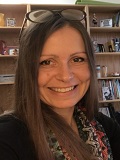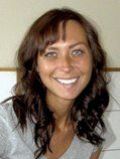|

Marta Halaczkiewicz
|
|

Elena Shvidko
| Elena: Where are you from, and what are you studying?
Marta: I come from Poland, where I learned
English as an additional language. My experiences learning English and
other languages propelled me to become an English instructor. To fulfill
my dream, I began my studies in the English Teaching College at the The
University of Warsaw. Following a unique chance to study in an
English-speaking country, I came to the United States on a scholarship
and completed my undergraduate (Communication Arts) and graduate degrees
(TESOL), which granted me the necessary credentials to pursue my
vocation of teaching English language. In 2007, I became an ESL
instructor at the Intensive English Program (IEP) at Western Michigan
University (WMU) in Kalamazoo, MI. That is when I discovered that my
classroom can be positively transformed by digital technologies. In
pursuit of more knowledge and expertise on the topic, I completed a
graduate degree in Educational Technology at WMU and found out that
there is so much more I can learn. In 2012, I came to teach at the
Intensive English Language Institute at Utah State University and to
pursue a doctorate degree at the Instructional Technology and Learning
Sciences here.
Elena: What topics in second language writing research excite you right now?
Marta: As part of my dissertation studies, I
explore how online social spaces can assist ELLs in learning the new
language. Known as affinity spaces (Gee, 2004) - or places where
dedicated participants converge to share and learn knowledge about their
common passion - many online portals are particularly ripe with ELL
writers perfecting their craft (Black, 2007). Whether they geek out
about J-pop (Lam, 2000) or share their fanfiction about Harry Potter
(Kelley, 2016), fan ELLs are a very prolific population of writers
online. These writing in the wild practices have been proven to provide
motivation for novice writers (Curwood, Magnifico, & Lammers,
2013) and have been already explored by EFL classrooms to improve
lexical development (Sauro & Sundmark, 2016).
Elena: Could you share one way that research informs your teaching and/or vice versa?
Marta: Inspired by the above-mentioned
research, I have explored the uses of affinity spaces and fanfiction
writing in my classroom. My students have engaged in online writing with
the writing community that shares their passions. After a few
iterations of this project, I designed a pilot study in which my
students played a highly popular mobile game PokemonGo and shared their
experiences in writing with their classmates. They also drew on the
online community resources to improve both their writing and gameplay.
My students perceive the activity as highly motivational and a welcome
change to a traditionally dreaded academic writing course.
Having learned from that experience, I designed another writing
activity which involved reading and writing fanfiction based on my
students’ favorite video games. This activity was met with tremendously
positive reactions from my class. I was able to enhance my students’
writing experiences as well as measure the impact of those experiences
on their lexical development. I am very lucky that I always have a
classroom to test all new ideas from my graduate work, as well as to
serve as a bedrock for my data collection. My learning and teaching
organically weave together.
Elena: What have you learned in your graduate courses
that, in your opinion, will lead you to accomplishing your professional
goals?
Marta: The biggest take-away from my
graduate work is that I need to stay abreast of the emerging theories
and technologies. However, I also learned to be brave and curious with
implementing novel ways of teaching. Regardless of how unorthodox a
methodology may seem, there are always lessons to be learned. My two
first graduate degrees prepared me to assist ELLs in their pursuit of
the new language and culture. My doctoral degree makes me question and
reflect on my methods in how they make learning motivating and
effective.
References
Black, R. W. (2007). Fanfiction writing and the construction of
space. E-Learning, 4(4), 384. https://doi.org/10.2304/elea.2007.4.4.384
Curwood, J. S., Magnifico, A. M., & Lammers, J. C.
(2013). Writing in the wild: Writers’ motivation in fan-based affinity
spaces. Journal of Adolescent & Adult
Literacy, 56(8), 677–685. https://doi.org/10.1002/JAAL.192
Gee, J. P. (2004). Situated language and learning: A
critique of traditional schooling. New York, NY:
Routledge.
Kelley, B. (2016). Chocolate frogs for my betas!: Practicing
literacy at one online fanfiction website. Computers and
Composition, 40, 48–59. https://doi.org/10.1016/j.compcom.2016.03.001
Lam, W. S. E. (2000). L2 literacy and the design of the self: a
case study of a teenager writing on the Internet. TESOL
Quarterly, 34(3), 457–482. https://doi.org/10.2307/3587739
Sauro, S., & Sundmark, B. (2016). Report from
Middle-Earth: fan fiction tasks in the EFL classroom. ELT
Journal, 70(4), 414–423. https://doi.org/10.1093/elt/ccv075
Marta Halaczkiewicz is a senior lecturer in the
Intensive English Language Institute of Utah State University. She holds
master’s degrees in TESOL and in educational technology. She is
pursuing a PhD in instructional technology and learning sciences. Her
research interests include game-enhanced instruction, CALL, MALL, and
second language writing pedagogy.
Elena Shvidko is an assistant professor at Utah State
University. Her research interests include interpersonal aspects of
language teaching and learning, embodied interaction in language
teaching, second language writing, and teacher professional
development. |

